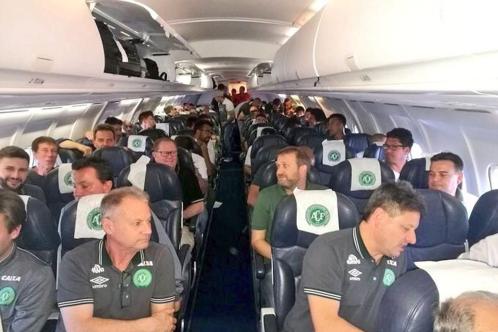| | Sport 
[ 2016-11-30 ] 

Chapecoense players and staff posted pictures online as they waited for takeoff Football fans united by grief as dream of glory ends in tragedy
One of football’s most unlikely success stories
ended in tragedy when nearly every member of a
little-known Brazilian team was killed in an air
crash in Colombia.
Six of the 77 passengers and crew survived when
the British Aerospace 146 plane came down 30 miles
short of Medellin. The pilots had reported an
electronic failure. There were also reports that
the aircraft had run out of fuel in trying to
avoid bad weather.
The team, Chapecoense, had been due to play in a
cup final, having returned to Brazil’s first
division after almost 40 years. British air
accident investigators were being sent to help
with the inquiry.
Hours earlier, the players, coaches and press had
gathered at Guarulhos airport in Sao Paulo on
Monday night for Chapecoense’s departure to
their match in Colombia.
It was a disappointing moment for Matheus Saroli,
son of the team’s manager, as he discovered that
he had forgotten his passport and could not board
the flight.
He said goodbye to his father and the team as they
boarded Flight 2933 for Santa Cruz in Bolivia,
where they would have a brief layover before
heading for Medellin. There, the tiny team from
southern Brazil hoped to match Leicester City’s
exploits in the Premier League last season by
prying the Copa Sudamericana from the Colombian
heavyweights Atletico Nacional.
That moment of carelessness saved Matheus’s
life. As the BAe 146 approached Medellin in fog
and heavy rain, it ploughed into a hillside,
killing his father, Caio Junior, and 75 other
people on board.
In a message thanking sympathisers and asking for
privacy in the family’s moment of grief, Matheus
said: “We are strong and we will get through
this.” Brazil was in shock yesterday after the
news that the small provincial team who had made a
run for the big league was gone, wiped out on the
way to the final that could have brought it
glory.
As thousands of fans showed up at Chapecoense’s
stadium in the Brazilian town of Chapeco to pay
their respects, President Temer declared three
days of mourning. The country’s 2014 elections
were also shaped by a high-profile crash, when one
of the frontrunners, Eduardo Campos, died when his
aircraft smashed into a building in Sao Paulo.
Brazil’s first division clubs, led by
Corinthians, said that they would show their
solidarity after the latest disaster by
contributing players to Chapecoense, who made it
into the top division two years ago, to prevent
them from being relegated.
In Colombia, Atletico players said that their
opponents should be declared champions of the
tournament and asked fans to wear white in
respect.
One of the most heartfelt messages came from Paulo
Paixão, a former fitness trainer for the
Brazilian national team, whose son Anderson was
Chapecoense’s physiotherapist and died in the
crash. Anderson Paixão’s own son died of a
heart attack in 2001, aged 25.
Paulo Paixão wrote: “It’s a very difficult
moment for us. We were completely taken by
surprise. But the good Lord wanted us to go
through this again. We already lost Alessandro in
2002 . . . I think this is our fate.”
Also among the dead was midfielder Matheus Biteco,
21, whose wife gave birth to a boy four months
ago.
Those who survived suffered horrific injuries.
Jackson Follmann, a goalkeeper, had a leg
amputated, while Alan Ruschel, a defender,
sustained serious spine and leg injuries that
could leave him paraplegic, doctors said.
The crash not only dashed the hopes of Chapeco, a
town of 210,000 people known for agriculture, but
also devastated Brazilian sports journalism.
Twenty-two reporters, cameramen and photographers,
including six from Fox Sports Brazil, were
accompanying the team. Only one survived.
One other player, the defender Helio Zampier —
known as Neto — survived the crash, as did a
flight attendant and another crew member. Rescuers
said that Neto had been pulled from the wreckage
six hours after the crash with serious head
injuries. Doctors said that he had hypothermia and
was able to move only his eyes.
“We were able to rescue six people alive but one
of them died on the way to the hospital,” Jose
Gerardo Acevedo, a police commander, said. That
victim was Marcos Danilo Padilha, a goalkeeper
whose spectacular last-minute save helped to win
the semi-final.
A video on the team’s Facebook page showed them
getting ready for the flight. They were due to
play Atletico in Medellin for the away leg of the
final, then play their home game in the city of
Curitiba, 300 miles from Chapeco.
Éverton Pereira, a Chapeco resident and fan, told
the newspaper Folha that he had been part of a
plan to organise 80 buses to drive to Curitiba
because football authorities had deemed the
team’s 22,000-seat home arena too small to host
such a high-profile match.
“My mum called me with the shocking news. I
decided not even to open my shop this morning, the
whole city was in shock,” he said. “The town
has ground to a halt, lots of shops and business
chose not to open today. Everyone just wants to
stick together, it’s a small town and people
knew the players, it’s like everyone lost a
member of their family.”
The mountainous terrain of Cerro Gordo, where the
aircraft crashed, hindered rescuers, with a
helicopter having to turn back due to poor
weather. Search teams were initially encouraged
when they found several survivors but the mission
quickly turned into an effort to recover bodies.
Two weeks ago the same aircraft ferried the
Argentine national team to San Juan for a World
Cup qualifying match. Source - The Times

... go Back | |




